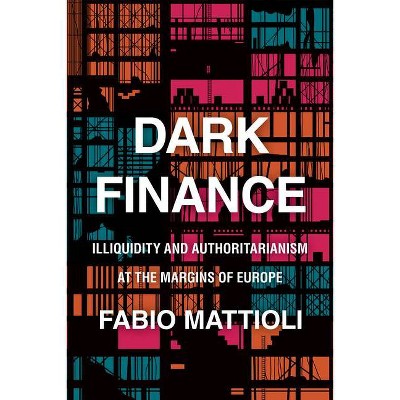Dark Finance - by Fabio Mattioli (Paperback)

Similar Products
Products of same category from the store
AllProduct info
<p/><br></br><p><b> About the Book </b></p></br></br>"This book describes the importance of finance and real estate for the emergence of authoritarian regimes. Through an ethnographic study of the pseudo-oligarchs, failed European businessmen, frustrated managers, and unpaid workers that populate Macedonia's construction sector, Fabio Mattioli illustrates how financialization results in illiquidity, rather than cheap money. Mattioli's manuscript describes the political relations that emerge from restricting access to cash, a political-economic juncture that has received little attention in the literature on financialization, but that is increasingly recognized as a critical research agenda. Guiding readers through the genesis and contradictions of a landscape of political oppression and financial failure, the book details Macedonian workers' and managers' struggle to recover meaningful social lives as they become more deeply entangled in the web of illiberal politics"--<p/><br></br><p><b> Book Synopsis </b></p></br></br><p><i>Dark Finance</i> offers one of the first ethnographic accounts of financial expansion and its political impacts in Eastern Europe. Following workers, managers, and investors in the Macedonian construction sector, Fabio Mattioli shows how financialization can empower authoritarian regimes--not by making money accessible to everyone, but by allowing a small group of oligarchs to monopolize access to international credit and promote a cascade of exploitative domestic debt relations. </p> <p>The landscape of failed deals and unrealizable dreams that is captured in this book portrays finance not as a singular, technical process. Instead, Mattioli argues that finance is a set of political and economic relations that entangles citizens, Eurocrats, and workers in tense paradoxes. Mattioli traces the origins of illiquidity in the reorganization of the European project and the postsocialist perversion of socialist financial practices--a dangerous mix that hid the Macedonian regime's weakness behind a façade of urban renewal and, for a decade, made it seem omnipresent and invincible. <i>Dark Finance</i> chronicles how, one bad deal at a time, Macedonia's authoritarian regime rode a wave of financial expansion that deepened its reach into Macedonian society, only to discover that its domination, like all speculative bubbles, was teetering on the verge of collapse.</p><p/><br></br><p><b> Review Quotes </b></p></br></br><br>Original, timely, and gorgeously written, <i>Dark Finance</i> makes key theoretical contributions to several fields of inquiry, including economic anthropology, political economy, anthropology of the state, social studies of time and gender, and Europeanization as a cultural and financial process. It represents anthropology at its best and should be read and taught widely.--Emanuela Grama "<i>American Anthropologist</i>"<br><br>Fabio Mattioli has written a vibrant book, mapping the networks sustaining Nikola Gruevski's power and the lived experience of authoritarian financialization, and offering novel insights into Macedonia's and Europe's political economy. The book combines ethnographic and an almost-poetic sensitivity, rich in its description of economic, urban, and social landscapes. In addition to being a skillfully executed ethnography, <i>Dark Finance: Illiquidity and Authoritarianism at the Margins of Europe</i> is a fascinating case study, a crime story, a political drama, and a political thriller. Highly recommended not only for those seeking to understand Gruevski's regime but anyone interested in illiberal finance.--Gábor Scheiring "<i>Review of Democracy</i>"<br><br><i>Dark Finance</i> offers fresh insight on contemporary populism in Europe and fine-grained descriptions of how illiquidity functions. This is the most compelling, persuasive, and chilling analysis of North Macedonia's place in the global economy, and the cynical exploitation of a people by their elected government, that I have read in the past decade.--Keith Brown "Arizona State University"<br><br><i>Dark Finance</i> takes the anthropology of financialization to the next level. From gender relations and exploitation to the volatile politics of popular desires and authoritarianism in North Macedonia in the years after the global financial crisis, Fabio Mattioli's holistic and relational take on the contradictions of global finance in the postsocialist periphery is pathbreaking.--Don Kalb "University of Bergen and Utrecht University"<br><br>As financialization and populism reshape the world, Fabio Mattioli's rich and timely analysis traces the intersection of finance-fueled construction and authoritarian rule in Macedonia. It critically highlights the illiberal politics that drive financialization and urban development, while carefully attending to the everyday lives of construction workers who are building Skopje's new skyline.--Sohini Kar "London School of Economics and Political Science"<br><br>Mattioli excels in this respect: documenting the operations and implications of finance and financialization beyond its own narrow social domain--the one of financial markets, institutions, expert knowledge, and so on--and within the life-worlds, relations, and practices of a variety of social actors. This allows him to analyze aspects likely to be missed by other perspectives.--Marek Mikus "<i>Journal of Cultural Economy</i>"<br><p/><br></br><p><b> About the Author </b></p></br></br><b>Fabio Mattioli</b> is a Lecturer of Social Anthropology at the University of Melbourne.
Price History
Price Archive shows prices from various stores, lets you see history and find the cheapest. There is no actual sale on the website. For all support, inquiry and suggestion messages communication@pricearchive.us




















